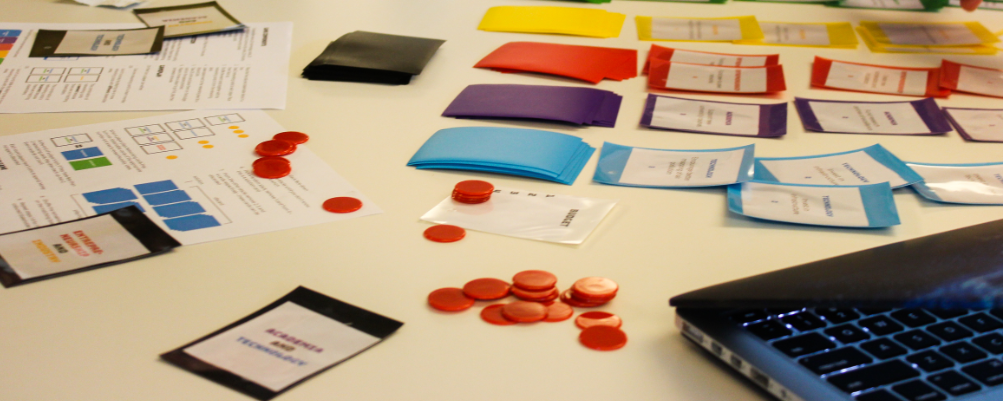
Blog
Playtesting the Innovation Policy board game at IGL2018
1 August 2018
As we are reaching the end of the process of developing a tailored innovation policy-themed board game, the time is ripe to start reflecting on the feedback that has helped us build the game throughout.
For the last five months, we have been working with Digital Liberties, a cooperative of game makers, designers and political analysts to develop an innovation policy-themed board game building the capacity of innovation policymakers to create better and more efficient policies.
Our players take on the role of innovation policymakers attempting to put together a package of policies to address large social issues, like air pollution or data protection for example. Players must then use a range of tools to uncover evidence and policy ideas from five different stakeholder groups. The game also includes a fixed budget and event cards that are meant to disrupt the game and force players to adapt their strategy.
In essence, the game and its mechanics are quite simple. They were designed to get the players to understand the need for collaboration, the importance of experimentation and the necessity of bringing in different perspectives to understand the needs of the beneficiaries of specific policies.
Prototyping and testing make perfect
Prototyping different versions of the game and testing them has been a key part of the development process. Back in April, we tested a first version of the game with 26 South East Asian policymakers, participating in the Global Innovation Policy Accelerator, a collaborative development programme for senior innovation policymakers. We gathered great feedback on the theme, the narrative and the mechanics of the game, which was incorporated into the next version of the game.
Early June, we were incredibly excited about being able to playtest this new version of the game at this year’s Innovation Growth Lab Global Conference in Boston. The conference gathered more than 160 participants from 23 countries over three days, with around 50 speakers and facilitators running sessions on topics as varied as participation in innovation or experimentation in government, all the way through to the use of simulation for policy training and practice.

Participants playing the Innovation Policy board game prototype
Three things we learnt about the game that we will work on improving
The session was a great opportunity to test the game yet again with innovation policy professionals and practitioners and gather their feedback to understand how to improve the game and develop its final version. So here are three of the main feedback elements, and how we are working on improving them:
- The policymakers testing the game wanted to engage with the innovation policy theme of the game even more. The game includes policy cards, but there is no pre-requirement to know about innovation policy to be able to play the game. While this is in itself positive, because it means anyone can play the game we are developing, it also turned out to be slightly frustrating for the players who already did know a lot about the innovation policymaking process. A solution to this was to include in the rules an option for players to discuss the collection of policies at the end of each round and present it as a coherent proposal to the rest of the group. Another interesting suggestion we are still considering is to include blank policy cards, for players to build their own and feel more engaged in the game and its outcome as a result.
- It was not always clear enough that the game is a team building exercise rather than a literal simulation of the policymaking process. There are always trade-offs when developing a game, and one of them is that achieving the level of simplification fit to a game, you have to compromise on the realism of the system you are simulating. The game’s objective however was always about highlighting the processes underlying policymaking (collaboration, experimentation and participation) rather than providing a detailed simulation. As a result, we have also been working on clarifying the rules and that aspect of the game.
- Some of the participants found it difficult to understand the rules in the first round. This element of feedback shows how important a well-written rule book is, particularly if we want the game to be playable without any of the developers present. We have been reworking the rules, making them clearer and simplifying the layout, to make sure any player will be able to jump right in.
We will be finalising the game over the next few weeks, and it will be made available on the Nesta website by the end of summer. In the meantime, we will continue sharing lessons about what Nesta and Digital Liberties have learnt from the process of developing this board game.
Do not hesitate to get in touch with us should you want to learn more or if you have any questions and suggestions.
This blog was originally published on the Nesta website on Thursday 26 July 2018. You can read the original blogpost here.
